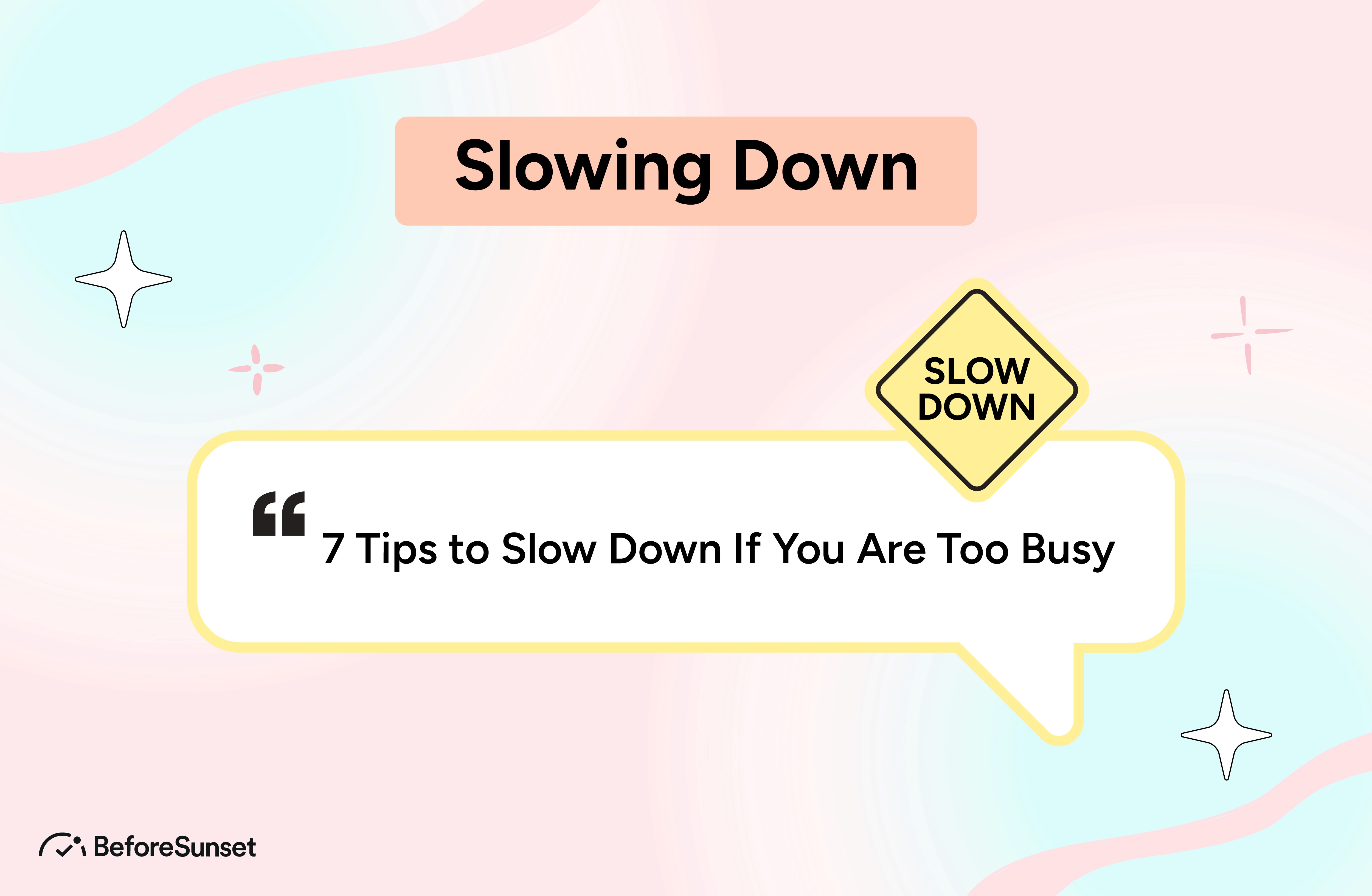In today's "hustle culture", speed is a sign of success. A common measure of this is how quickly a new feature can be released.
In one hour, how many potential customers can you call? For what percentage of each day are you able to work?
This has a word in Japanese: "Karoshi" meaning "death by overwork" Dr. Larry Dossey coined the expression "Time Sickness" in the United States in 1982 to describe our obsession with time and how we never have enough of it in our relentless urge to do more.
We live in a world where the quick outpace the slow, but at what cost?
Exhaustion
Feeling alienated
Burnout
Lack of real social connection
Decreased productivity
Impaired judgment
Missing out on life
The constant feeling that we don’t have enough time
Perhaps you've internalized the belief that success can be attained only by working tirelessly and maintaining a constant state of motion.
But let's face it: being busy all the time is draining, unhealthy, and unproductive. This is where the concept of "slowing down" comes in.
You may boost your productivity and long-term performance by scheduling regular downtime to rest, refuel, and revitalize.
Even if it goes against common sense, slowing down can actually help you speed up in the long run. By taking breaks and practicing self-care, you can prevent burnout, improve your overall well-being, and enhance your focus and creativity.
In this post, we'll share seven tips to help you ditch the busyness and embrace a more intentional, mindful approach to work and life.
So get ready to say goodbye to the hustle, and hello to a more balanced, productive you to enjoy life!
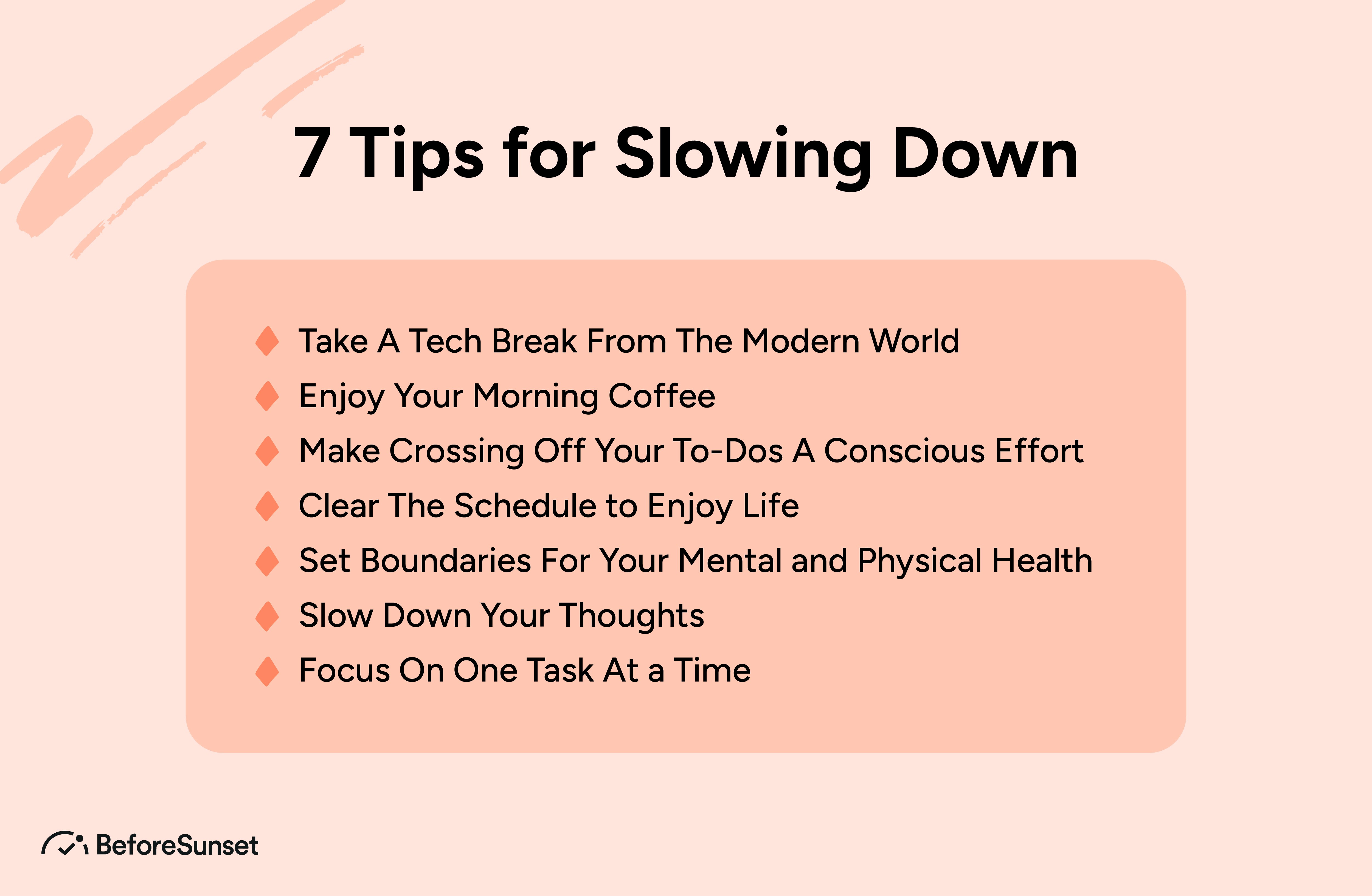
7 Tips to Enjoy the Benefits of Slowing Down
We must end the futile race against time in which we constantly feel compelled to occupy ourselves. For the sake of our health and happiness, we must finally break free from our addiction to success.
It'sWhen life gets too hectic, the answer is to learn to calm down and go at a slower pace. People are happier and healthier when they slow down and take the time to appreciate what they have. There are times when it seems impossible.
Slowing down is a choice and it is not always an easy one to make. Below, though, you'll find a few suggestions for making the process less tedious. Never forget that you may take things slow and easy if you want to.
Try different things until you find what makes you happy, then ditch it if it doesn't.
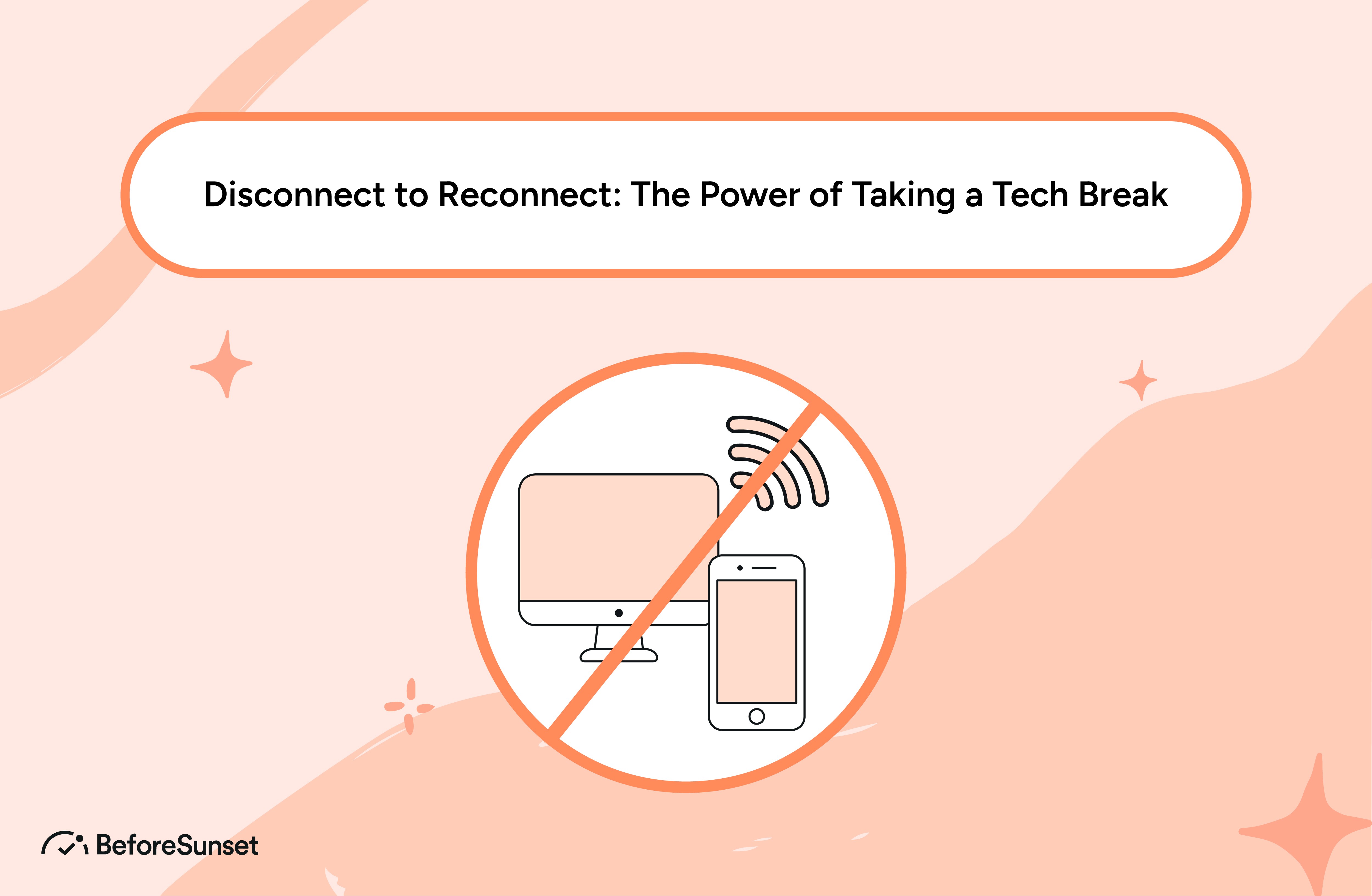
Tip #1: Take A Tech Break From The Modern World
As a society, we are all too familiar with the sensation of being enslaved by our electronic gadgets, with their incessant beeping, buzzing, and scrolling.
In a world where we're constantly connected and always "on", it's easy to get sucked into the never-ending stream of emails, notifications, and social media updates.
Yet if we don't pause now and then for slowing down, we may lose sight of the forest for the trees and our own humanity in the process. Putting down the phone and focusing on what really matters is one of the most effective ways to recharge and enjoy life.
When we limit our time spent on electronic devices, we make room in our life for deeper connections with the people and places around us.
I mean, why not test it out? Whether it's a full-on digital detox once a week, a weekend away, or just an hour a day, disconnecting from technology has been shown to improve our mood, energy levels, and overall health.
So go ahead and power down - your mind and body will thank you for it!
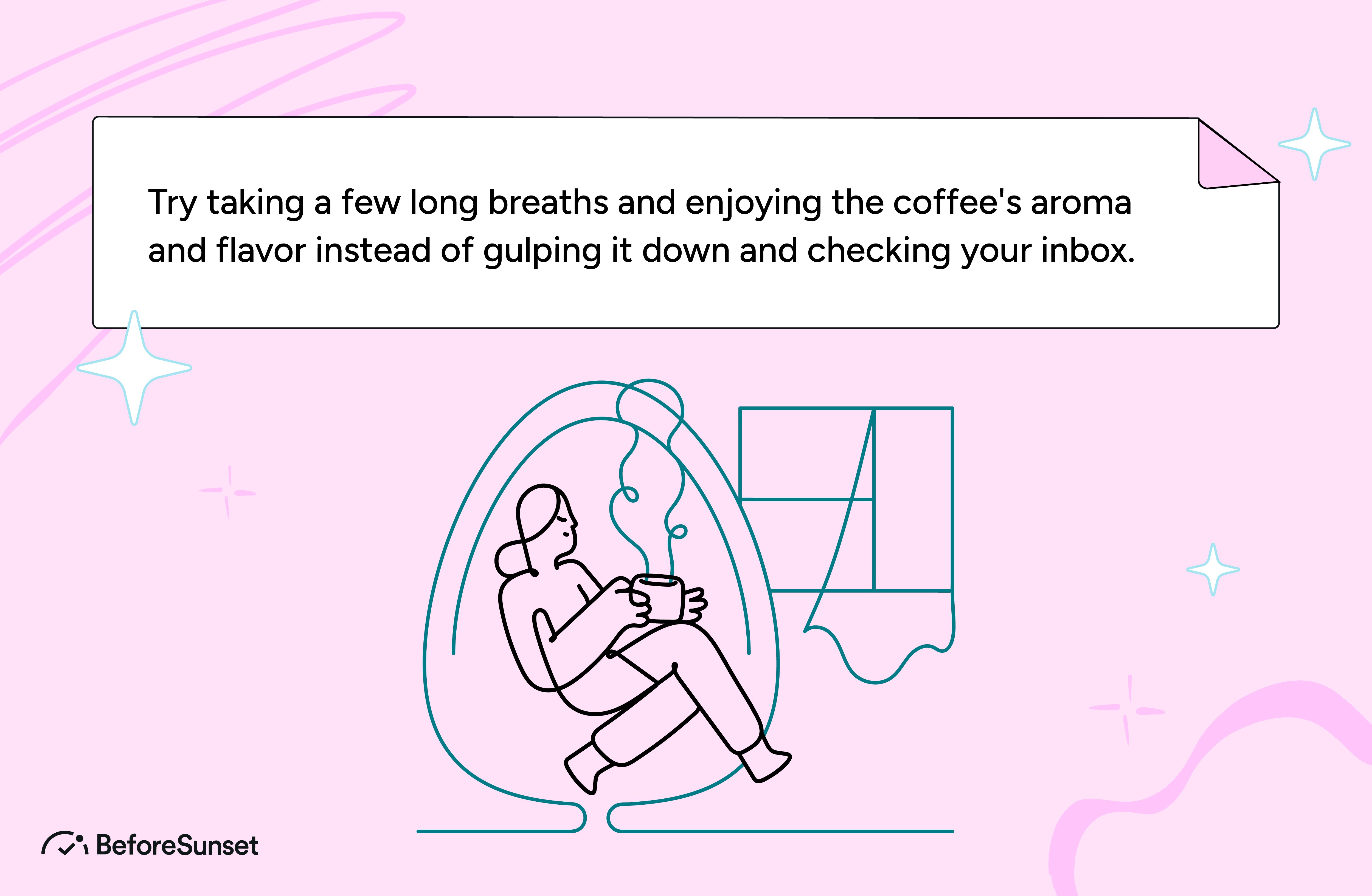
Tip #2: Enjoy Your Morning Coffee
Our hectic lives make it simple to neglect the pleasures of a solid morning routine. Yet if you slow down in the morning to appreciate your coffee, you may set the tone for a calm and thoughtful day.
Taking time to enjoy your morning coffee is a simple yet effective way to help you slow down and start your day with intention.
Try taking a few long breaths and enjoying the coffee's aroma and flavor instead of gulping it down and checking your inbox.
When you take a moment to slow down like this, you can improve your sense of presence and stability throughout the day.
So, the next time you brew a pot of coffee in the morning, sip slowly and savor the present moment, without thinking about a million things at once. It is the little moments that help us in the slowing down process.
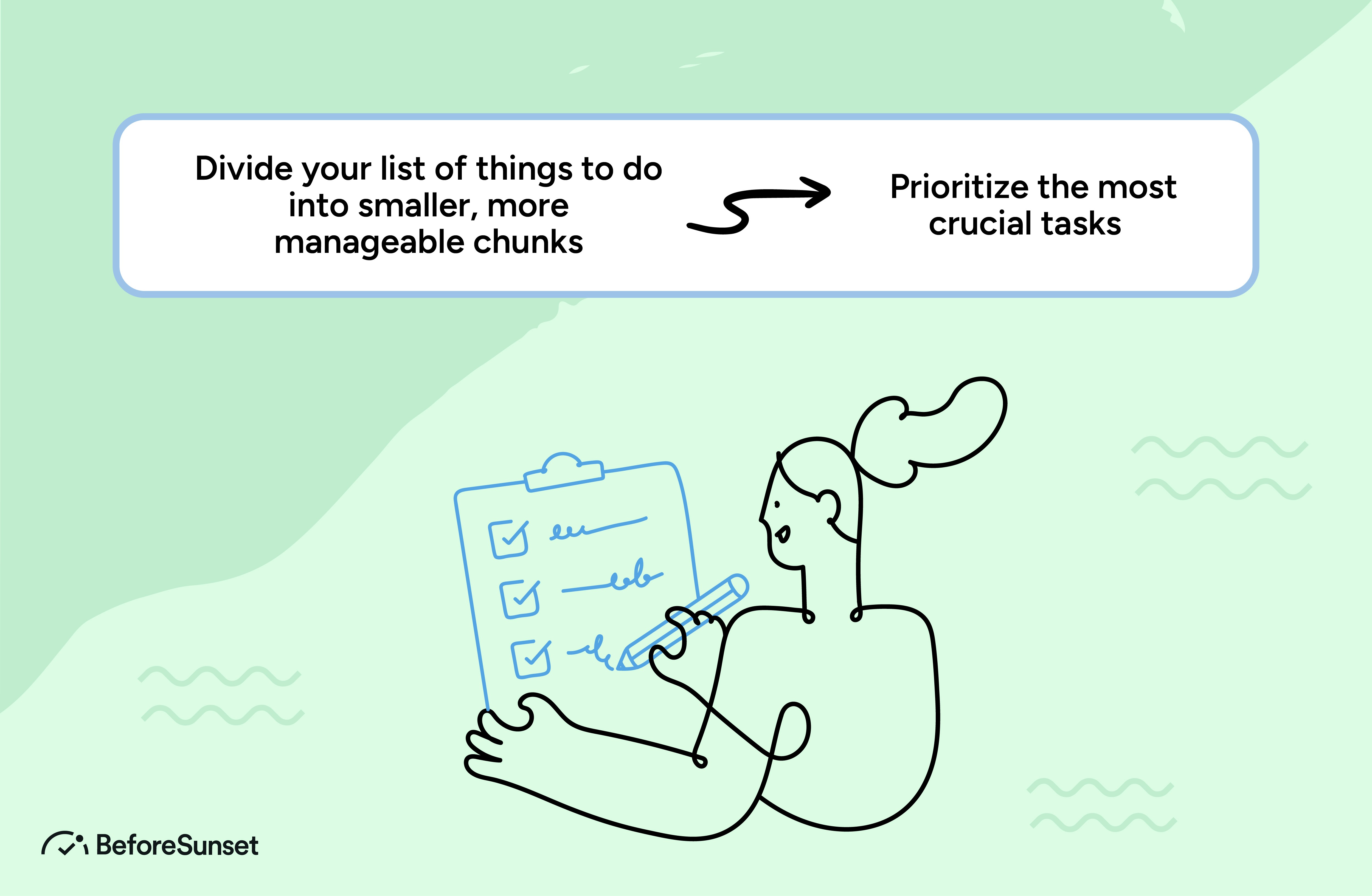
Tip #3: Make Crossing Off Your To-Dos A Conscious Effort
To-do lists have the potential to become stressful and cumbersome in our fast-paced world.
We may feel that we'll never get ahead of the game or complete all of our jobs and commitments. Yet if we break down our to-do list into manageable chunks, we can feel less overwhelmed and more accomplished.
To get started, divide your list of things to do into smaller, more manageable chunks, and then rank their priority. Then, prioritize the most crucial tasks and see them through to completion before moving on to the less pressing ones. Reward yourself by crossing each item off your to-do list as you finish it.
The strategy will help you feel accomplished and relieve tension as you work through your to-do list. In addition, it may be really inspiring to look back at the day's accomplishments and know that you've accomplished a lot of things that you can check off your list.
Just because you're slowing down doesn't mean you have to stop doing anything. Recharging our batteries requires conscious management of our time and resources.
The only way to escape the rat race and achieve some semblance of equilibrium is to organize our tasks in accordance with their importance and reward ourselves when we reach a goal.
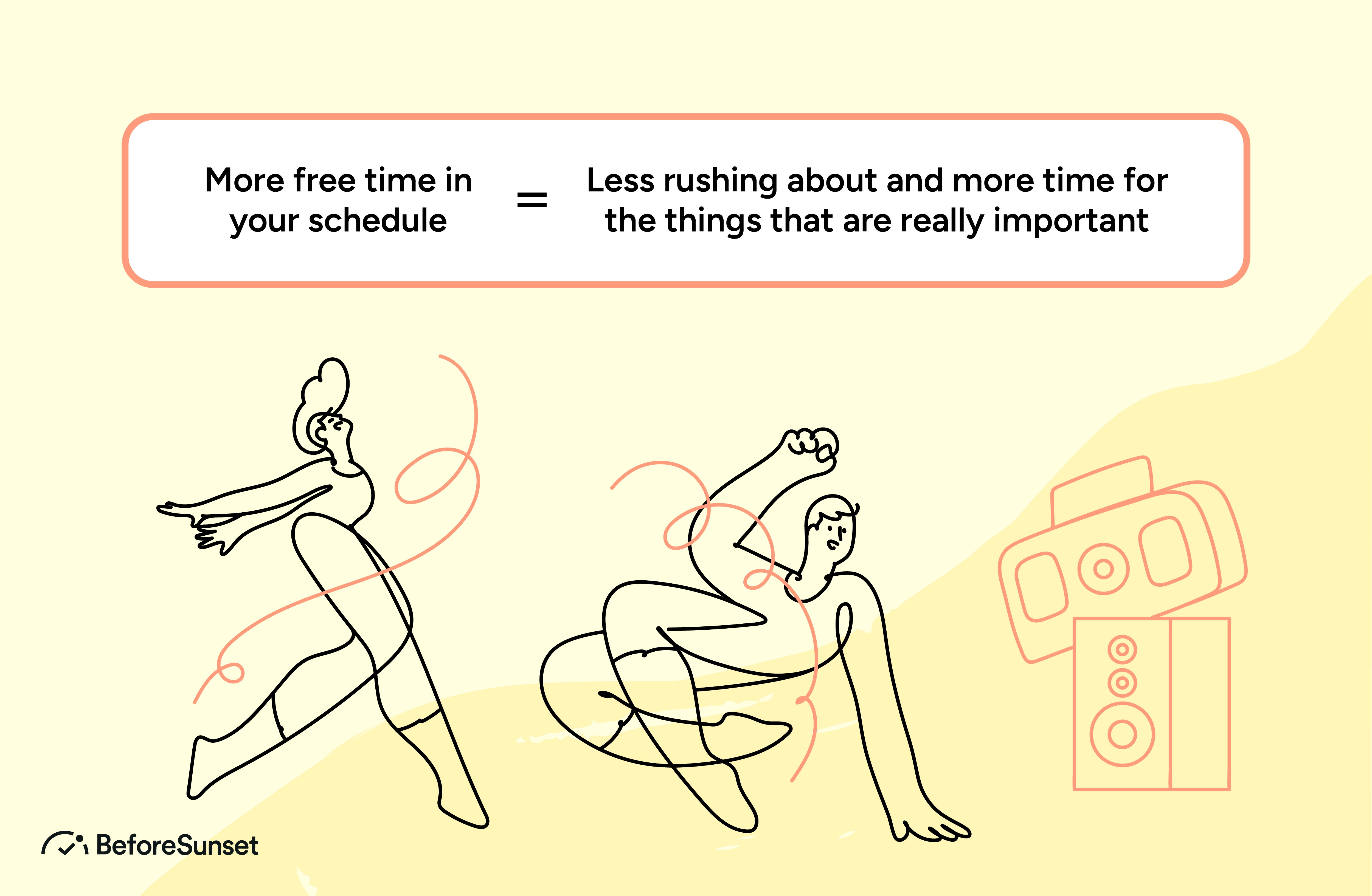
Tip #4: Clear The Schedule to Enjoy Life
These days, it's not uncommon to have a packed schedule full of meetings and appointments, with little time left over for anything else.
Yet exhaustion and lack of output are possible consequences of a constantly on-the-go lifestyle. Because of this, it is recommended that you occasionally declutter your schedule.
As a first step, take stock of your obligations and decide which ones are crucial and which ones can wait.
Is it possible to postpone or assign someone else to handle any of the upcoming meetings? Do you have the ability to identify what needs to be done first and what may be dropped?
More free time in your schedule means less rushing about and more time for the things that are really important. Saying no to new responsibilities can help you focus on your own mental health and well-being.
The point is that slowing down need not entail sacrificing efficiency. In fact, doing so can result in enhanced originality, focus, and overall achievement. Thus, free up some time in your schedule and appreciate the advantages of taking things slowly.
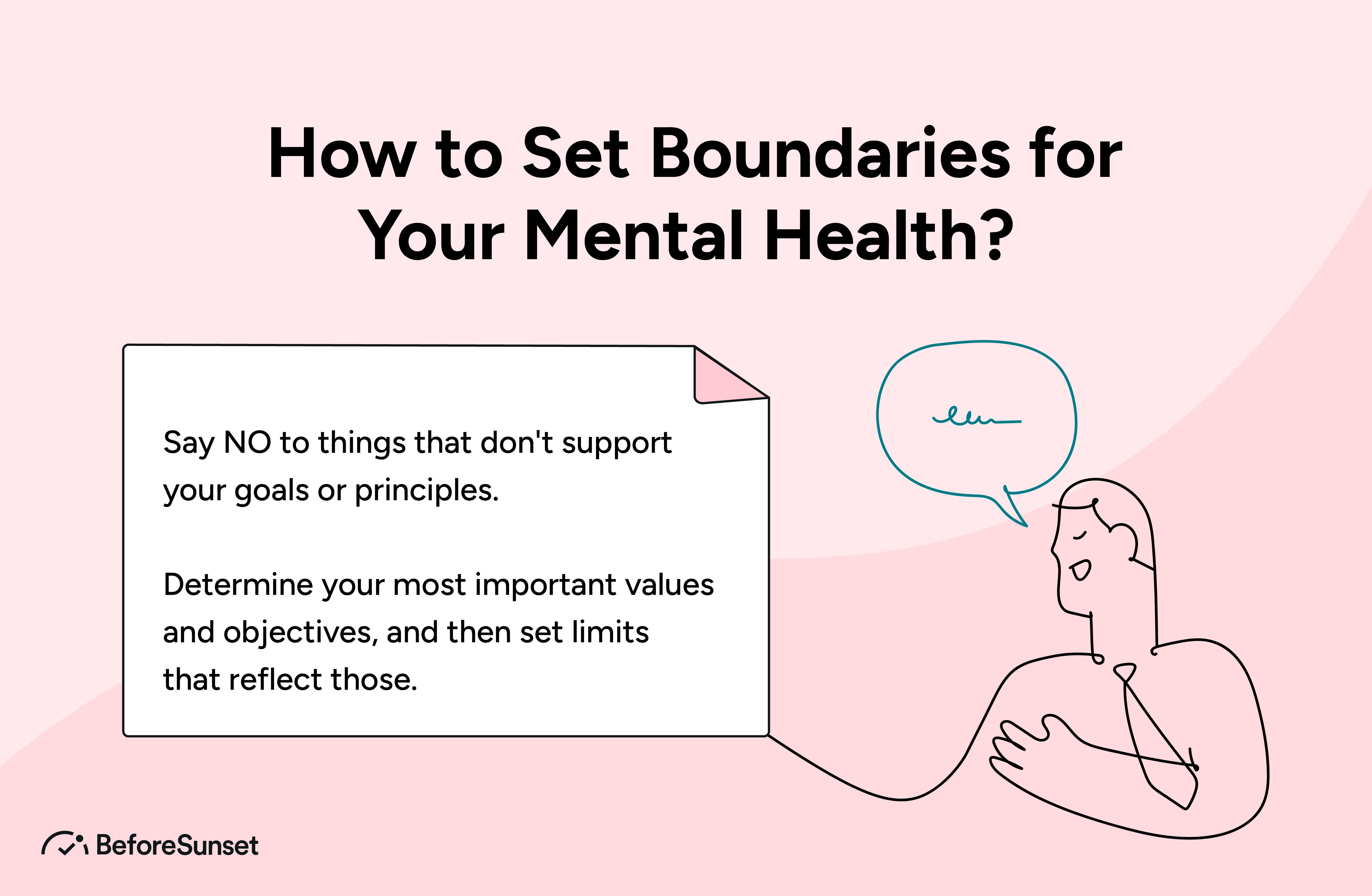
Tip #5: Set Boundaries For Your Mental and Physical Health
Saying "no" and setting boundaries can be seen as a sign of weakness in the hustler's worldview. Maybe we think that by saying yes to everything, we're proving our worth and loyalty. Yet, this usually results in over-committing and eventually burning out.
For effective time management and slowing down, setting limits is essential. Saying "no" to things that don't support your goals or principles might be tough, but it's essential. Make sure it is a conscious effort to avoid feeling overwhelmed.
First, you should determine your most important values and objectives, and then set limits that reflect those. Those who place a premium on family time may decide to forgo working on the weekends or in the evenings.
Likewise, be sure to make your limits known to those around you. Your loved ones, friends, and coworkers should all be aware of and respect your boundaries.
Remember that limits are put in place not to hold you back but to let you soar. When you establish limits for yourself, you gain mastery over your time, reduce stress, and boost productivity.
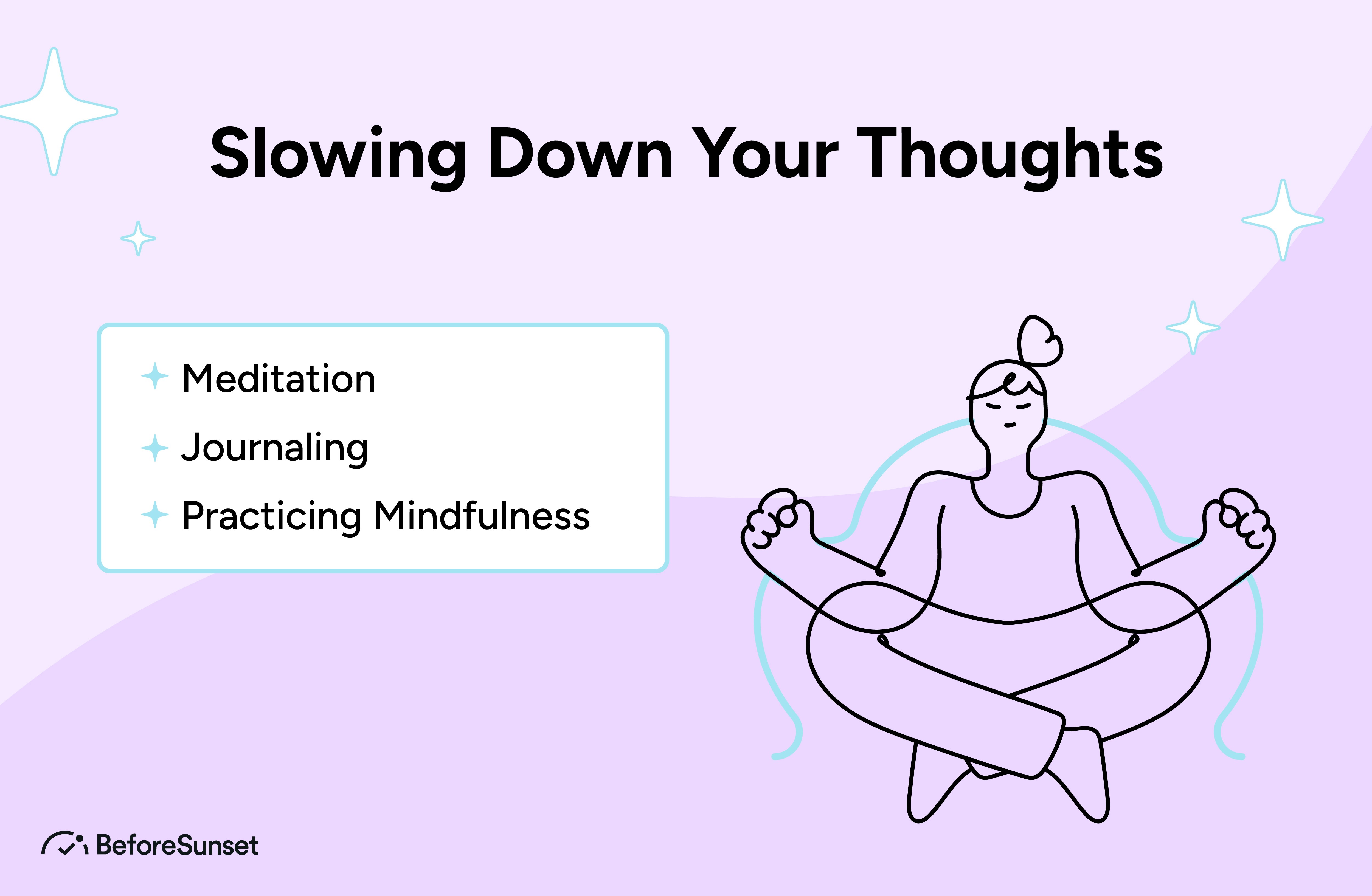
Tip #6: Slow Down Your Thoughts
No surprise our thoughts are constantly in motion, making it difficult to relax and concentrate.
It's possible that our minds are preoccupied with hypothetical disasters, worst-case scenarios, or tomorrow's conversation with a coworker. Short-circuiting our brains is necessary at times.
Taking the time to slow down your thoughts can be incredibly beneficial for your overall well-being and productivity.
Start by practicing mindfulness, which involves being present and fully engaged in. This can be as simple as taking a few deep breaths and focusing on your surroundings.
You can also try meditation, which has been shown to reduce stress and improve cognitive function.
Journaling every day can also be a helpful practice because it forces us to physically release our thoughts from our heads and onto paper.
You may also try running or taking a cold shower, both of which have been shown to help us shift gears in our thinking and break free of mental ruts.
By slowing down your thoughts, you can improve your concentration and creativity, and be more effective in your work and personal life.
Tip #7: Focus On One Task At a Time
Multitasking is ubiquitous, and it may seem like a good method to get more done in less time. Yet studies have shown that attempting to multitask might have the opposite effect and reduce productivity while increasing stress. To get more done, concentrate on a single activity at a time rather than juggling several.
Working on a single activity at a time increases the likelihood that it will be completed successfully and quickly. Also, you may focus entirely on what you're doing, which has been shown to improve both creative output and the ability to solve problems and helps you slow down and enjoy life more.
The Power of Slowing Down: Embrace a More Balanced and Productive Life
In sum, recognizing the value of slowing down can help you achieve greater harmony and success.
Taking care of one's mental and physical health, strengthening one's relationships, and achieving one's goals are all bolstered by prioritizing rest, reflection, and significance.
To slow down is not the same as giving up or being lazy; rather, it is a conscious decision to live with greater focus and intention.
Let us, then, recognize the value of spending time just taking things easy and reaping the rewards of a richer, more satisfying existence.
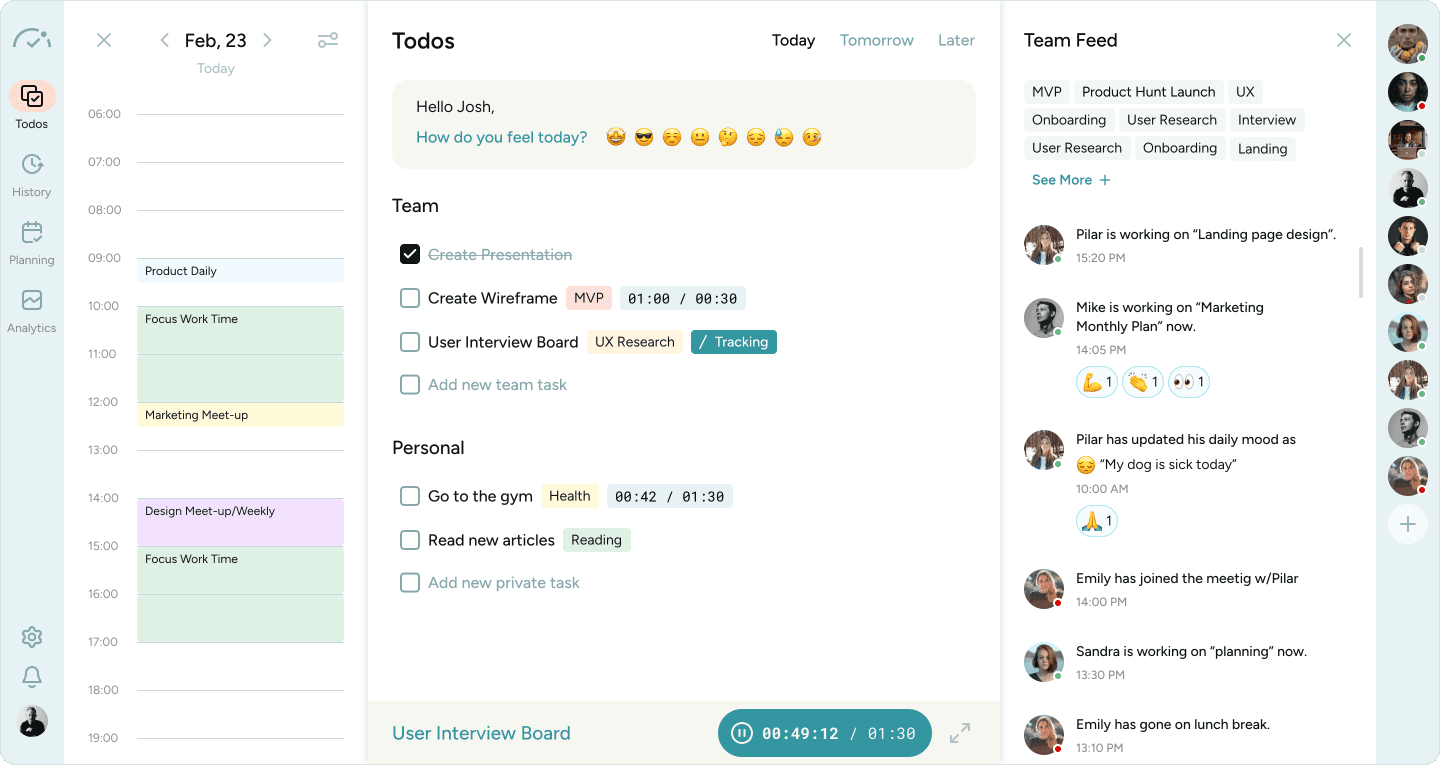
Put Slowing Down Into Work For Productivity
As we've said times and times again, taking a breather to gather one's thoughts and regain energy allows for a more focused and productive return to one's work.
It is possible to work smarter, not harder, by adding productivity tools into our daily routines.
If you're hoping to get more done in less time, BeforeSunset might be just what the doctor ordered. It's easy-to-use layout and robust features will aid in keeping you organized, keeping tabs on your progress, and achieving your goals.
You may increase your productivity by a significant margin if you learn to appreciate the value of pausing now.


